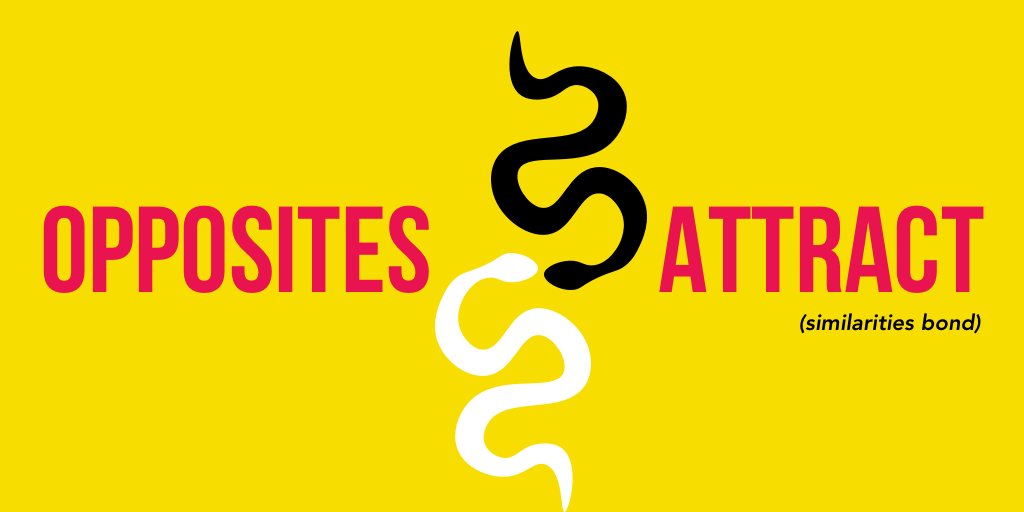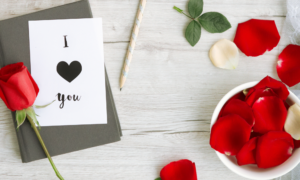We’ve all heard it: opposites attract. And in fact, most of us have probably experienced it ourselves, to a certain degree. And it’s entirely probable that those experiences were amazing, until they weren’t.
LOL!
And there’s a reason for it.
People who are different from us are exciting.
Anthony Robbins tells us that humans have six basic needs:
- Certainty: assurance you can avoid pain and gain pleasure
- Uncertainty/Variety: the need for the unknown, change, new stimuli
- Significance: feeling unique, important, special or needed
- Connection/Love: a strong feeling of closeness or union with someone or something
- Growth: an expansion of capacity, capability or understanding
- Contribution: a sense of service and focus on helping, giving to and supporting others
The first four needs are core to our intimate relationships, while five and six can be a part of our relationships, but are also both individually and externally focused.
The first two needs, though are key. Humans crave both certainty and uncertainty in a delicate balance.
Which is where the opposites attract idea comes into play.
When someone is our opposite, or a better way of stating it, our complement, they provide uncertainty. They can surprise us, make us think in new and different ways, highlight the best (and worst) parts of ourselves, make us more aware of our own abilities and styles and so on.
Which can make us fall in love with them, and with ourselves in contrast to them.
And in kink, it’s probably most evident in our power dynamics.
Dominant and submissive.
Top and bottom.
Master and servant.
And so on. Our opposites. Our complements.
Two dominants in a relationship are probably going to butt heads regularly, because you are both used to being in charge. Ditto if you re both submissive, and prefer to let others lead, you might not get things done, and feel frustrated with each other.
There are dominant/dominant relationships. Absolutely. Of course there are. Some people have a smaller need for uncertainty or difference in their relationships. And realistically, they might be different enough in other areas and compatible enough in their relationship styles to make it work.
In relationships in general, though, we are drawn to complementary personality traits, needs and preferences because they are a better fit for us.
Sometimes it’s because these people bring skills to our partnership that we lack, as opposed to them being more exciting. Because they model behaviors or traits we would like to have for ourselves and in our lives.
The thing is, though, opposites don’t usually attract. At least not long term.
Because a real opposite would have nothing in common with us.
In reality, we likely have much more in common than the surface might suggest, and that is how we bond.
A study published in the Journal of Personality and Social Psychology, focused on 1,523 couples, friends and acquaintances, and found:
Within-dyad similarity was statistically significant on 86% of variables measured. To determine whether similarity was primarily attributable to niche construction (i.e., selection) or social influence, we tested whether similarity increased as closeness, intimacy, discussion, length of relationship, and importance of the attitude increased. There were no effects on similarity of closeness, relationship length, or discussion of the attitude.
WOW. Eighty-six percent similar.
Things like background, communication styles, culture, personality traits, values, ethics, morals, humor, etc.
You and your partner can be radically different when it comes to taste in music, your personal clothing style, what you like to watch on TV, food, and the hours you prefer to keep, and that can be really sexy and give you not only things to learn from and share with each other, but also give you space within the relationship to be yourself, without feeling too locked into a specific role.
But none of that is necessarily critical to your ability to connect and bond. If your partnership is strong in the areas of certainty, significance and connection/love, then your areas of difference will not matter much.
Until your bond starts to suffer.
Then every little difference can be a gigantic neon arrow pointing to the exit door and all the reasons you never should have fallen for them in the first place.
It’s a balance, and it’s usually sorted out within the first 12-24 months.
That’s the amount of time people often know if the balance is not right.
Most relationships fail within 18 months. Partly because it takes time for us to really get to know each other and get past the “best behavior” time period. But also because it takes time to really dig down intimately and compare who we are to each other in a variety of situations.
And that failure is OK.
Because it sets us free to find the RIGHT balance of opposites attracting and similarities bonding.






